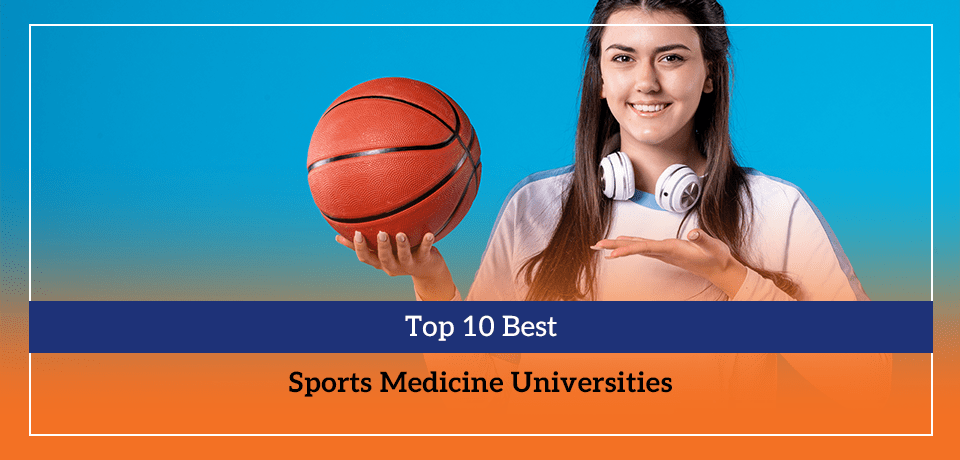What if you could combine your passion for sports with your drive to help others? Sports medicine offers a unique opportunity to do just that. As the world of sports continues to evolve, so does the demand for qualified professionals who can address the complex needs of athletes at all levels.
Choosing the right university is a critical step in starting a successful career in sports medicine. The quality of education, research opportunities, and clinical experiences can impact your future success. In this write-up, we will explore the best universities for sports medicine. So, let’s begin.
What is Sports Medicine?
Sports medicine is a specialized field that focuses on preventing, diagnosing, treating, and rehabilitating sports-related injuries and exercise. It encompasses various medical and scientific disciplines, including orthopaedics, physical therapy, sports nutrition, sports psychology, and exercise physiology. Sports medicine professionals work with athletes of all ages and skill levels, from recreational participants to elite performers.
Why Sports Medicine is Vital Today
In today's world, where physical activity and sports participation are increasingly prevalent, sports medicine is crucial in promoting healthy lifestyles and optimizing athletic performance. Here are some key reasons for its importance:
- Injury Prevention: Sports medicine professionals develop tailored training programs, provide guidance on proper techniques, and recommend preventive measures to reduce the risk of injuries.
- Injury Treatment and Rehabilitation: They diagnose and treat various sports-related injuries, such as sprains, strains, fractures, and concussions. They also oversee rehabilitation processes to help athletes recover and return to their sport.
- Performance Enhancement: Sports medicine experts help athletes optimize their performance through nutritional counselling, strength and conditioning programs, and mental skills training.
- Health and Wellness: They address broader health concerns in athletes, including cardiovascular health, hydration, and sleep hygiene, to ensure overall well-being.
Popular Areas of Specialization
Within sports medicine, there are several popular areas of specialization:
- Orthopaedic Surgery: This speciality focuses on the surgical and non-surgical treatment of musculoskeletal injuries, such as ligament tears, fractures, and tendonitis.
- Physical Therapy: Physical therapists work with athletes to restore function, improve mobility, and reduce pain through various therapeutic techniques, including manual therapy, exercise prescription, and electrotherapy.
- Sports Nutrition: Sports nutritionists guide optimal nutrition and hydration strategies to fuel performance, promote recovery, and maintain overall health.
- Sports Psychology: Sports psychologists help athletes develop mental skills, such as focus, motivation, and stress management, to enhance performance and well-being.
- Exercise Physiology: Exercise physiologists study the effects of exercise on the body and develop personalized training programs to improve fitness and performance.

Pathways to a Career in Sports Medicine
Undergraduate Sports Medicine Courses
What to Expect
Undergraduate sports medicine programs provide a strong foundation in the scientific principles underlying human movement, injury prevention, and rehabilitation. These programs often combine classroom learning with hands-on practical experience.
Core Courses
- Anatomy: A deep understanding of human anatomy is essential for diagnosing and treating injuries.
- Kinesiology: This course explores the mechanics of human movement, including joint motion, muscle function, and neuromuscular control.
- Biomechanics: This field analyzes the forces acting on the human body during movement, helping to identify potential injury mechanisms and develop effective rehabilitation strategies.
Benefits of Starting with a Bachelor's in Sports Medicine
- Broad Knowledge Base: A bachelor's degree provides a comprehensive overview of sports medicine, including its various subfields.
- Career Flexibility: Graduates can pursue various career options, such as athletic training, strength and conditioning, or sports administration.
- Preparation for Graduate Studies: A strong undergraduate foundation can help prepare students for advanced degrees in physical therapy, orthopaedic surgery, or sports medicine.
Graduate and Doctoral Programs in Sports Medicine
Advanced Degree Options and Career Impact
Graduate and doctoral programs in sports medicine offer specialized training and research opportunities, leading to advanced careers in academia, clinical practice, or research.
Focus Areas:
- Clinical Research: This area involves researching to advance the understanding and treatment of sports injuries.
- Physical Therapy: Physical therapists work with athletes to rehabilitate injuries, improve performance, and prevent future injuries.
- Athletic Training: Athletic trainers provide comprehensive healthcare services to athletes, including injury prevention, evaluation, and rehabilitation.
Career Opportunities in Sports Medicine
The field of sports medicine offers a diverse range of career opportunities for individuals passionate about sports and healthcare. Clinically, professionals can work as sports physicians who diagnose and treat injuries, physical therapists specialising in sports rehabilitation, or athletic trainers providing on-field care and injury prevention. For those interested in research, roles as research scientists allow for investigating new treatments and technologies in sports medicine.
Academic careers as educators or professors in sports medicine programs provide the opportunity to teach and mentor future sports medicine professionals. Consulting for athletic organizations offers the chance to advise teams and athletes on various aspects of sports performance and injury prevention.
Unique career paths within sports medicine include working with professional sports teams, where individuals can be part of high-performance teams and contribute to the success of elite athletes. Roles in wellness and rehabilitation centres allow working with a broader population, focusing on injury prevention, fitness, and overall health.
The emerging field of eSports has also created new opportunities for sports medicine professionals, with a focus on the unique physical and mental demands of competitive gaming. Additionally, the growing importance of performance analytics has led to roles in data analysis and sports science, where professionals can use technology to optimize athlete performance and reduce injury risk.
Criteria for Selecting the Best Sports Medicine Degree Programs
Program Accreditation and Recognition
Accreditation ensures that a program meets specific educational standards and prepares graduates for professional licensure or certification. Search programs accredited by recognized bodies such as the Commission on Accreditation of Athletic Training Education (CAATE) or the Commission on Accreditation of Allied Health Education Programs (CAAHEP). Accreditations signify a commitment to quality education and can enhance career prospects.
Faculty Credentials and Research Involvement
A strong faculty with expertise in various aspects of sports medicine is crucial. Experienced faculty members can provide valuable guidance, mentorship, and research opportunities. Look for programs with faculty actively involved in research, publishing papers, and presenting at conferences. This indicates a commitment to advancing the field and keeping up with the latest developments.
Availability of State-of-the-Art Clinical and Research Facilities
Access to modern clinical and research facilities is essential for hands-on learning and cutting-edge research. Look for programs that offer state-of-the-art equipment, laboratories, and clinical settings. These facilities provide opportunities to work with real-world scenarios, gain practical experience, and contribute to groundbreaking research.
Industry Connections and Alumni Success Stories
Strong industry connections can open doors to internships, research opportunities, and job placements. Look for programs with established relationships with professional sports teams, healthcare organizations, and research institutions. Additionally, alumni success stories can provide insights into the program's effectiveness and the career paths of its graduates.
Program Flexibility: Online, Hybrid, or On-Campus Options
Consider your lifestyle and learning preferences when choosing a program format. Online, hybrid and on-campus options offer different levels of flexibility and engagement. Online programs provide flexibility and convenience, while hybrid programs combine online and in-person learning. On-campus programs offer a traditional learning experience with face-to-face interaction with faculty and peers.

Top 10 Best Sports Medicine Universities
1. Harvard University
Harvard's prestigious medical school provides a world-class education in sports medicine. It is one of the best sports medicine universities in the USA. Students can work alongside renowned faculty, conduct groundbreaking research, and gain clinical experience at top-tier hospitals. The university's interdisciplinary collaboration emphasises innovation and ensures students receive a comprehensive education.
2. University of Pittsburgh
The University of Pittsburgh is a leading athletic training and rehabilitation sciences institution. Students benefit from a strong emphasis on evidence-based practice, hands-on clinical experiences, and state-of-the-art research facilities. The university's strong ties to professional sports teams and healthcare organizations provide unique opportunities for students to gain real-world experience.
3. Stanford University
Stanford University is a pioneer in sports medicine research and education. Its focus on innovation and technology has led to significant injury prevention, treatment, and performance enhancement advancements. Students have access to cutting-edge research laboratories, high-performance training facilities, and opportunities to work with elite athletes.
4. University of Michigan - Ann Arbor
The University of Michigan offers a comprehensive curriculum in sports medicine, combining academic rigour with practical experience. Students benefit from a strong alumni network, opportunities to work with professional athletes, and a focus on interdisciplinary collaboration.
5. University of Southern California
USC provides excellent clinical rotations and interdisciplinary opportunities, allowing students to gain valuable experience in various settings. The university's location in Los Angeles offers unique access to professional sports teams, entertainment industry professionals, and a diverse population.
6. University of Florida
The University of Florida emphasizes sports injury prevention and wellness, strongly focusing on evidence-based practice. Students have access to state-of-the-art facilities, including a world-class sports medicine institute. The university's warm climate and abundant outdoor sports opportunities are ideal for studying sports medicine.
7. Ohio State University
Ohio State University offers exceptional clinical exposure and research facilities. Students can participate in cutting-edge research projects, work with professional sports teams, and gain hands-on experience in various clinical settings. The university's strong academic programs and supportive faculty create a stimulating learning environment.
8. University of Virginia
The University of Virginia combines academic rigour with a focus on holistic health. Students learn to address athletes' physical, mental, and emotional needs, promoting optimal performance and well-being. The university's beautiful campus and strong athletic tradition provide an ideal setting for studying sports medicine.
9. University of Illinois - Urbana-Champaign
The University of Illinois is a leading institution for research in sports medicine and kinesiology. Students have opportunities to work with world-class faculty, contribute to groundbreaking research projects, and gain practical experience in various settings.
10. University of California - Berkeley
UC Berkeley offers outstanding sports medicine programs in California. Students benefit from a strong academic foundation, hands-on clinical experiences, and opportunities to work with professional sports teams. The university's San Francisco Bay Area location provides access to various healthcare providers and sports organizations.
Comparison Table of Top Sports Medicine Universities
|
University
|
Tuition Fees (approx. USD)
|
Program Length
|
Research Opportunities
|
Faculty-to-Student Ratio
|
Clinical Training Hours
|
|
Harvard University
|
$55,000+
|
4 years (MD) + Residency
|
Extensive
|
Low
|
High
|
|
University of Pittsburgh
|
$50,000+
|
4 years (BS) + 3 years (DPT)
|
Moderate to High
|
Moderate
|
High
|
|
Stanford University
|
$55,000+
|
4 years (BS) + 3 years (MD)
|
High
|
Low
|
High
|
|
University of Michigan - Ann Arbor
|
$50,000+
|
4 years (BS) + 3 years (MD)
|
High
|
Moderate
|
High
|
|
University of Southern California
|
$55,000+
|
4 years (BS) + 3 years (DPT)
|
Moderate
|
Moderate
|
High
|
|
University of Florida
|
$45,000+
|
4 years (BS) + 3 years (DPT)
|
High
|
Moderate
|
High
|
|
Ohio State University
|
$40,000+
|
4 years (BS) + 3 years (DPT)
|
Moderate
|
Moderate
|
High
|
|
University of Virginia
|
$50,000+
|
4 years (BS) + 3 years (MD)
|
High
|
Moderate
|
High
|
|
University of Illinois - Urbana-Champaign
|
$40,000+
|
4 years (BS) + 3 years (DPT)
|
High
|
Moderate
|
High
|
|
University of California - Berkeley
|
$45,000+
|
4 years (BS) + 3 years (DPT)
|
High
|
Moderate
|
High
|

Emerging Universities Offering Sports Medicine Programs
University of Western States
Located in Portland, Oregon, the University of Western States is a renowned institution for health sciences education. Its sports medicine programs are highly regarded and offer a strong foundation in anatomy, physiology, and biomechanics. The university's focus on hands-on learning and clinical experience prepares graduates for various careers in the field.
Regional Institutions
Many regional universities across the United States are expanding their sports medicine offerings. These institutions often have strong ties to local sports teams and healthcare providers, offering students unique internships, research, and clinical rotations opportunities. Some notable examples include:
- East Tennessee State University: Known for its athletic training program, ETSU offers a variety of sports medicine courses and clinical experiences.
- California State University, Fullerton: This university offers a comprehensive sports medicine program on injury prevention, rehabilitation, and performance enhancement.
- University of North Carolina at Chapel Hill: A leading institution in sports medicine research, UNC-Chapel Hill offers a variety of graduate programs in exercise science and sports medicine.
Niche Fields in Sports Medicine
Emerging universities are also catering to niche fields within sports medicine. Some of these specialized areas include:
- Sports Chiropractic: This field focuses on the chiropractic treatment of sports injuries and performance enhancement.
- Sports Nutrition: Sports nutritionists work with athletes to optimize their diet and hydration for peak performance.
- Sports Psychology: Sports psychologists help athletes develop mental skills such as motivation, focus, and stress management.
- Sports Massage Therapy: Sports massage therapists use specific techniques to help athletes recover from injuries, reduce muscle soreness, and improve performance.
How to Choose the Right Sports Medicine Program
Factors to Consider
When selecting a sports medicine program, consider your long-term career goals. Are you interested in clinical practice, research, or both? This will help you narrow your options and choose a program that aligns with your aspirations. Location is another important factor. Consider the geographic region you'd like to work in and the specific opportunities available.
Additionally, evaluate the program's cost, including tuition fees, housing, and living expenses. Finally, the faculty members at each university will be researched. Look for experienced and well-respected professors who can provide guidance and mentorship.
Importance of Hands-on Experience and Clinical Training
Hands-on experience and clinical training are essential to a successful sports medicine education. Look for programs that offer opportunities to work with athletes in clinical and field settings. Internships, practicums, and clinical rotations can provide invaluable experience and help you develop the skills necessary to succeed.
Tips for Narrowing Down Your List of Potential Universities
To narrow your list of potential universities, start by researching accredited programs in your desired geographic region. Consider factors like program reputation, faculty expertise, and available resources. Also, contact current students and alumni for firsthand insights into the program's strengths and weaknesses.
Additionally, visit campuses and attend information sessions to get a feel for the university culture and meet with faculty members. By carefully considering these factors, you can make an informed decision and choose the best sports medicine program to help you achieve your career goals.

Application Tips for Sports Medicine Students
Crafting a Compelling Application
Undergraduate Programs:
- Highlight Academic Achievements: Emphasize strong grades in science courses, especially biology, chemistry, and physics.
- Showcase Athletic Involvement: Detail your participation in sports, whether as an athlete or a team member. Highlight any leadership roles, injuries, or rehabilitation experiences.
- Emphasize Volunteer Work: Volunteer experiences, particularly those related to healthcare or sports, can demonstrate your passion and commitment to the field.
Graduate Programs:
- Research Experience: Highlight any research projects you've undertaken, whether in a laboratory setting or as part of a clinical study.
- Clinical Experience: Emphasize your clinical experience, including internships, volunteer work, or employment in athletic training, physical therapy, or other related fields.
- Strong Letters of Recommendation: Seek letters from professors, mentors, or supervisors who can speak to your academic abilities, research skills, and clinical potential.
Strategies for Standing Out
- Personal Statement: Craft a unique personal statement to tell your story. Explain your passion for sports medicine, personal experiences that have influenced your career goals, and how your skills and experiences make you a strong candidate.
- Internships: Seek internships at sports clinics, hospitals, or professional sports teams to gain hands-on experience and build valuable connections.
- Research Experience: Take part in research projects to develop critical thinking and problem-solving skills. This can also help you gain valuable publication experience and strengthen your application.
Navigating Financial Aid, Scholarships, and Grants
- Explore Financial Aid Options: Research federal and state financial aid programs, institutional scholarships, and grants offered by the universities you're applying to.
- Seek Out Sports Medicine-Specific Scholarships: Look for scholarships specifically designed for students pursuing careers in sports medicine.
- Network with Professionals: Connect with sports medicine professionals who may be able to provide advice on funding opportunities or introduce you to potential sponsors.
Future Trends in Sports Medicine Education
Integration of Virtual Reality and AI in Sports Medicine Training
Virtual reality (VR) and artificial intelligence (AI) revolutionise sports medicine education. VR technology allows for immersive simulations of real-world scenarios, such as injury assessment, rehabilitation exercises, and surgical procedures. AI-powered tools can analyze vast amounts of data to identify patterns, predict injuries, and personalize treatment plans.
Increased Emphasis on Mental Health and Well-being in Athletes
Mental health has become a critical aspect of sports medicine. Future programs will likely incorporate courses on sports psychology, stress management, and mental performance optimization. This will equip healthcare professionals to address the psychological challenges faced by athletes, such as anxiety, depression, and burnout.
Emerging Areas Like eSports Medicine and Performance Analytics
The rise of eSports has created new opportunities for sports medicine professionals. As eSports athletes face unique physical and mental demands, there is a growing need for specialized care. Additionally, advancements in performance analytics enable sports scientists to analyze vast amounts of data to optimize training programs and reduce injury risk.

Frequently Asked Questions
What are the salary expectations for careers in sports medicine?
Salary expectations vary widely depending on the specific role and experience level. However, many sports medicine professionals, such as physical therapists, athletic trainers, and sports physicians, can earn competitive salaries.
Are there online degree programs for sports medicine?
While online courses and certifications are available in sports medicine, most degree programs require significant hands-on clinical experience, making fully online programs less common.
Which universities offer dual-degree options in sports medicine and related fields?
Many universities offer dual-degree options, such as MD/PhD programs or combined exercise science and physical therapy degrees. Some universities that offer these programs include Stanford University, the University of Michigan, and the University of California, Los Angeles.
How can I gain clinical experience before applying to a sports medicine program?
Consider volunteering at local sports clinics, hospitals, or athletic training facilities. Internships with professional sports teams or high school athletic programs can also provide valuable experience.
What certifications are needed after graduating in sports medicine?
The specific certifications required will depend on your chosen career path. For example, athletic trainers need to be certified by the Board of Certification for Athletic Training (BOC), and physical therapists need to be licensed by their state board of physical therapy.
How is sports medicine different from physical therapy?
Physical therapy is a broader field, but sports medicine is a specialized area focusing on injuries and conditions related to athletic activity. Sports medicine professionals often work with athletes of all levels, from recreational to elite.
Which scholarships are available for sports medicine students?
Numerous scholarships are available for sports medicine students. It's best to research specific scholarships offered by universities, professional organizations, and private foundations. Organizations like the National Athletic Trainers' Association (NATA) and the American Physical Therapy Association (APTA) offer scholarships to students in their respective fields.
Conclusion
As the field of sports medicine continues to evolve, the demand for skilled professionals will only grow. Now is the perfect time to explore your options and take the next step towards a rewarding future in this dynamic field. Investing in a top-tier sports medicine degree is a strategic move that can set you on a path to a fulfilling and impactful career.
Do you have any questions about sports medicine careers or university programs? Write your insight or experiences in the comment box below.